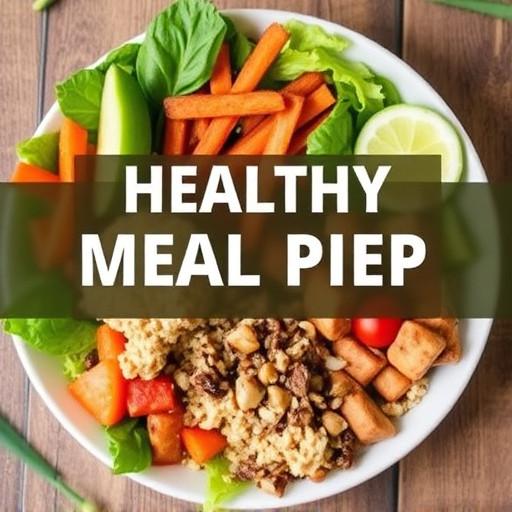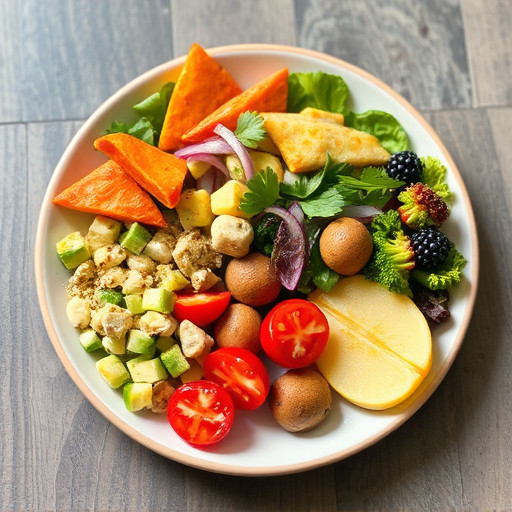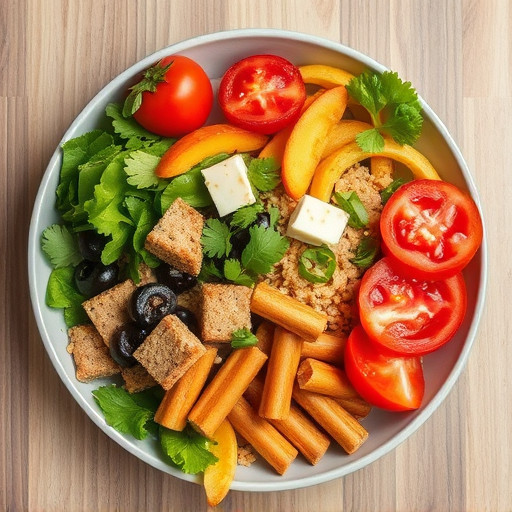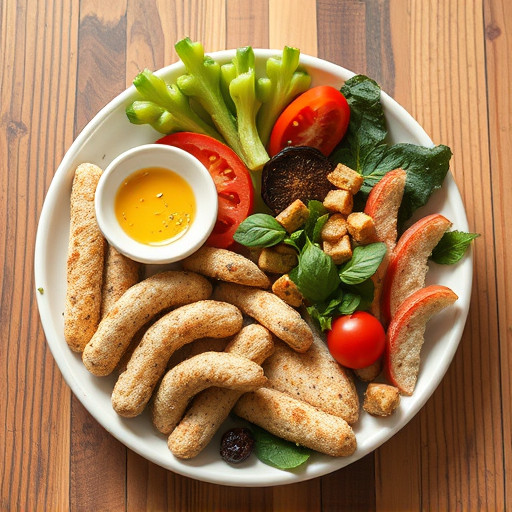
Adopting a plant-based diet requires strategic meal planning, focusing on diverse fruits, vegetables, whole grains, legumes, nuts, and seeds. Stock a pantry with essential staples, prepare large batches of meals using bulk cooking techniques, incorporate varied protein sources, healthy fats, and minerals, and store prepared meals safely for freshness and food safety.
Adopting a plant-based diet is a rewarding journey towards healthier living and sustainability. To make this transition seamless, efficient meal preparation is key. This article guides you through every step, from planning balanced meals to mastering bulk cooking techniques. We’ll explore essential pantry staples, offer creative meal ideas catering to diverse nutritional needs, and provide safe storage and reheating tips. Get ready to embark on a well-organized, delicious plant-based culinary adventure!
- Plan Your Meals: Create a Balanced Plant-Based Diet
- Stock Up on Essential Plant-Based Pantry Staples
- Prep and Cook in Bulk: Time-Saving Strategies
- Meal Ideas for Varied Nutritional Needs
- Tips for Storing and Reheating Plant-Based Meals Safely
Plan Your Meals: Create a Balanced Plant-Based Diet

When adopting a plant-based diet, planning your meals is key to ensuring you get all the necessary nutrients. Start by considering the food groups that are abundant in plants: fruits, vegetables, whole grains, legumes, nuts, and seeds. Aim for a variety within each group to cover essential vitamins and minerals. For example, include leafy greens for iron and calcium, citrus fruits for vitamin C, and whole grains like quinoa or brown rice for fiber and B vitamins.
Meal planning can involve creating a weekly menu where you rotate through different plant-based dishes. This way, you ensure diversity in your diet while also making grocery shopping easier. Consider the balance of flavors, textures, and colors to make your meals appealing and satisfying. You might pair roasted vegetables with a hearty legume-based stew or enjoy a fruit smoothie bowl topped with nuts and seeds for breakfast. Get creative, experiment, and adapt these suggestions to fit your taste preferences and dietary needs.
Stock Up on Essential Plant-Based Pantry Staples

When transitioning to a plant-based diet, one of the key steps is stocking your pantry with essential staples that will form the foundation of your meals. These include whole grains like quinoa, brown rice, and oats; legumes such as beans (black, kidney, chickpeas), lentils, and peas; nuts and seeds (almonds, walnuts, chia, hemp); and a variety of canned goods like tomatoes, beans in cans, and coconut milk. These items offer protein, fiber, vitamins, and minerals, ensuring your meals are nutritious and well-balanced.
Having these staples on hand makes meal prep much easier. You can quickly whip up salads with various grains and legumes, create hearty stews and soups, or experiment with plant-based versions of classic dishes like pasta and casseroles. A well-stocked pantry is a must for any plant-based cook looking to save time and effort while enjoying delicious, wholesome meals.
Prep and Cook in Bulk: Time-Saving Strategies

Prepping meals for a plant-based diet can be streamlined by adopting bulk cooking techniques. Set aside one day each week, often Sunday, to plan and prepare multiple meals that can be frozen and reheated. This approach not only saves time but also ensures you have nutritious options readily available throughout the week. Start with staples like rice, quinoa, beans, and lentils, which form the base of many dishes. Cook these in large quantities and store them in airtight containers in your freezer.
Meal planning is key to successful bulk cooking. Consider making a variety of dishes, including stir-fries, curries, soups, and casseroles, using an array of vegetables, fruits, nuts, seeds, and plant-based proteins like tofu or tempeh. Precut and portion these ingredients in advance to make subsequent meal preparation effortless. This strategy not only simplifies your routine but also encourages culinary creativity as you experiment with different flavors and combinations.
Meal Ideas for Varied Nutritional Needs

When planning plant-based meals, it’s essential to consider varied nutritional needs. For instance, ensure adequate protein intake from sources like tofu, tempeh, legumes, and quinoa. These options are versatile and can be incorporated into various dishes, catering to different tastes and preferences. Incorporating a mix of nuts and seeds in salads or as toppings adds healthy fats and crunch, enhancing overall nutrition.
For those focusing on calcium, include leafy greens like spinach or kale in meals. Fortified plant-based milk alternatives are also excellent sources. Vitamin B12, often lacking in plant-based diets, can be obtained through nutritional yeast, fortified cereals, or supplements. These creative solutions ensure that your meal prep meets all essential nutritional requirements while supporting a balanced and healthy plant-based lifestyle.
Tips for Storing and Reheating Plant-Based Meals Safely

When storing plant-based meals, it’s crucial to keep them both fresh and safe. Divide large batches of food into smaller portions before refrigerating or freezing to ensure you’re using ingredients within optimal timeframes. Use airtight containers or wrap foods tightly in plastic wrap or foil to prevent exposure to air and moisture, which can lead to spoilage. Label each container with the date prepared for easy tracking. For reheating, always warm meals gradually to avoid sudden temperature changes that can cause foodborne illnesses. Microwaves are convenient but shouldn’t be the only method; oven heating or stovetop cooking offer more control over temperature and can prevent hot spots in your food. Reheat until steaming hot throughout before serving.
Adopting a plant-based diet is an exciting journey, and proper meal preparation is key to success. By planning, stocking your pantry with essentials, and mastering bulk cooking techniques, you can create delicious, balanced meals while saving time. Remember, variety is essential for nutritional completeness, so experiment with different cuisines and ingredients. With these strategies in place, you’ll be well-equipped to enjoy a healthy, sustainable plant-based lifestyle.






